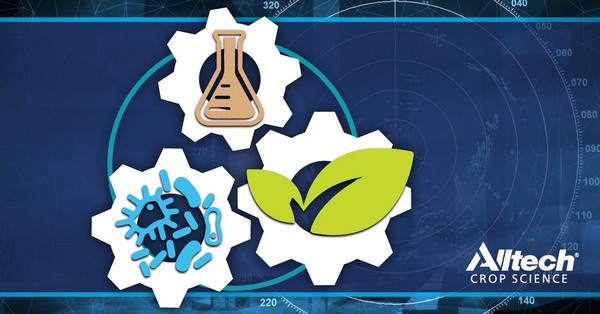There is more scrutiny today than ever before regarding conventional herbicides, fungicides and insecticides, and regulations are tightening.
“Complete replacement of synthetic chemistries is impractical,” said Nicholas Body, Alltech Crop Science (ACS) European technical manager. “The future of integrated pest management (IPM) programmes will include the best tactics from a variety of approaches, including nutritional and natural technologies, allowing the producers to reduce inputs while maintaining crop quality and improving sustainability measures.“
With today’s global trend among retailers to be very strict on chemical residues, building the best programme, including all type of technologies, is mandatory. “The use of predictive tools, such as disease models, and preventative, such as elicitors of natural defences, allows us to increase the quality of harvest with only a minimal use of conventional pesticides,” said Body.
A balanced nutritional programme is a vital component of an effective IPM programme. “An unhealthy plant, from a nutritional standpoint, is not able to defend itself against a potential pathogen attack,” said Body.

Healthy plants have a better chance of resisting disease pressures, and bioavailable micronutrients can support plants’ inherent defences. “If you trick a plant into thinking it’s going to be attacked, then the plant can develop its own metabolic pathways to fight the disease,” Body explained.
However, plants are not naturally proactive. “They are reactive organisms,” continued Nicolas Body. “Something must trigger a reaction in a plant to be defensive, unlike an immune system that can react on its own. By using biologicals, such as nutritionals and activators, we can elicit a response in the plant.”
Efficient crop management is moving towards a more proactive management of inputs. “We’ve been taught to scout fields, find what’s wrong and then fix it,” said Nicolas Body. “We’re moving to a new perspective where we can act on plant and soil health instead of acting on disease.”
Better nutrient management, especially nitrogen, is a key component of this movement and is crucial to sustainability. The focus is to reduce the amount of fertiliser applied to fields and hopefully improve the environment by minimising the application of excess nitrogen.
Many European farmers are faced with soils that have been depleted after many years in production. These cannot always provide a perfect balance between exported nutrients and the input fertilisation. With a loss in organic matter and beneficial microbes, the soil is also losing its capacity to act as a buffer. Fortunately, conservative and regenerative approaches to soil management are on the rise, and most farmers are implementing these techniques.
Body agrees that a total-system approach will serve crop farmers best in the future. “We continue to research how and when to use biologicals — whether it’s natural activators, foliar micronutrients, natural inoculants or biofungicides — with conventional methods in cropping systems to help producers with environmental stewardship,” he explained. “As any market progresses, we see increasing management of smaller and smaller pieces of the total system.”
For more information:
AllTech
www.alltech.com/cropscience

